| Srl | Item |
| 1 |
ID:
128001
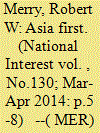

|
|
|
| 2 |
ID:
128008
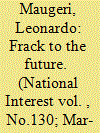

|
|
|
|
|
| Publication |
2014.
|
| Summary/Abstract |
THE WORLD has been caught by surprise by the United States' shale-oil boom. Analysts and experts are still clashing about both its true extent and the possibility of extending a shale revolution beyond North America. In just a few years shale oil could make the United States the world's top oil producer. But a shale revolution is unlikely in the rest of the world, due to some unique factors that characterize the U.S. oil and gas patch. The single-minded focus on the future of shale oil, however, risks obscuring another evolving dimension of the global oil picture that defies the past pessimism spread by peak-oil theorists who claimed that shortages loomed: beyond the United States, the world's oil-production capacity is also growing much faster than demand.
|
|
|
|
|
|
|
|
|
|
|
|
|
|
|
|
| 3 |
ID:
128002
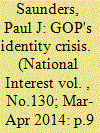

|
|
|
|
|
| Publication |
2014.
|
| Summary/Abstract |
IN 1958, after the Republican Party suffered a stinging defeat in the midterm elections that compounded the 1954 loss of its briefly held control of Congress, Whittaker Chambers sent a letter to William F. Buckley Jr. Buckley, who had founded National Review three years earlier, was trying to create a conservative insurgency. Like many other conservatives, including Ronald Reagan, he revered Chambers for his searing break with Communism and his exposure of Alger Hiss as a Soviet agent, which he chronicled in his memoir Witness. Chambers had warned the youthful Buckley against consorting with the radical Right, arguing that politicians such as Senator Joseph McCarthy discredited rather than bolstered a fledgling conservative movement.
|
|
|
|
|
|
|
|
|
|
|
|
|
|
|
|
| 4 |
ID:
128009
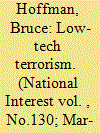

|
|
|
|
|
| Publication |
2014.
|
| Summary/Abstract |
AMONG THE MORE prescient analyses of the terrorist threats that the United States would face in the twenty-first century was a report published in September 1999 by the U.S. Commission on National Security/21st Century, better known as the Hart-Rudman commission. Named after its cochairs, former senators Gary Hart and Warren Rudman, and evocatively titled New World Coming, it correctly predicted that mass-casualty terrorism would emerge as one of America's preeminent security concerns in the next century. "Already," the report's first page lamented, "the traditional functions of law, police work, and military power have begun to blur before our eyes as new threats arise." It added, "Notable among these new threats is the prospect of an attack on U.S. cities by independent or state-supported terrorists using weapons of mass destruction."
|
|
|
|
|
|
|
|
|
|
|
|
|
|
|
|
| 5 |
ID:
128007
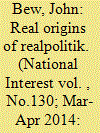

|
|
|
|
|
| Publication |
2014.
|
| Summary/Abstract |
IN 1934, a young British historian published his first book, The Italian Problem in European Diplomacy, 1847-1849. In it, he announced that a nation's foreign policy "is based upon a series of assumptions, with which statesmen have lived since their earliest years and which they regard as so axiomatic as hardly to be worth stating." It was the duty of the historian, he wrote, "to clarify these assumptions and to trace their influence upon the course of every-day policy."
|
|
|
|
|
|
|
|
|
|
|
|
|
|
|
|
| 6 |
ID:
128004
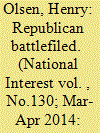

|
|
|
|
|
| Publication |
2014.
|
| Summary/Abstract |
THE COMMON wisdom holds that the GOP 2016 presidential race will boil down to a joust between the "establishment" and the "insurgents." The former will allegedly be more moderate and the latter more conservative. Since most polls for two decades have shown that around two-thirds to 70 percent of self-described Republicans call themselves conservative, this elite narrative will focus on just how much the establishment candidate will need to be pulled to the right in order to fend off his insurgent challenger.
|
|
|
|
|
|
|
|
|
|
|
|
|
|
|
|
| 7 |
ID:
128006


|
|
|
|
|
| Publication |
2014.
|
| Summary/Abstract |
WHAT ARE the implications for Taiwan of China's continued rise? Not today. Not next year. No, the real dilemma Taiwan will confront looms in the decades ahead, when China, whose continued economic growth seems likely although not a sure thing, is far more powerful than it is today.
Contemporary China does not possess significant military power; its military forces are inferior, and not by a small margin, to those of the United States. Beijing would be making a huge mistake to pick a fight with the American military nowadays. China, in other words, is constrained by the present global balance of power, which is clearly stacked in America's favor.
|
|
|
|
|
|
|
|
|
|
|
|
|
|
|
|